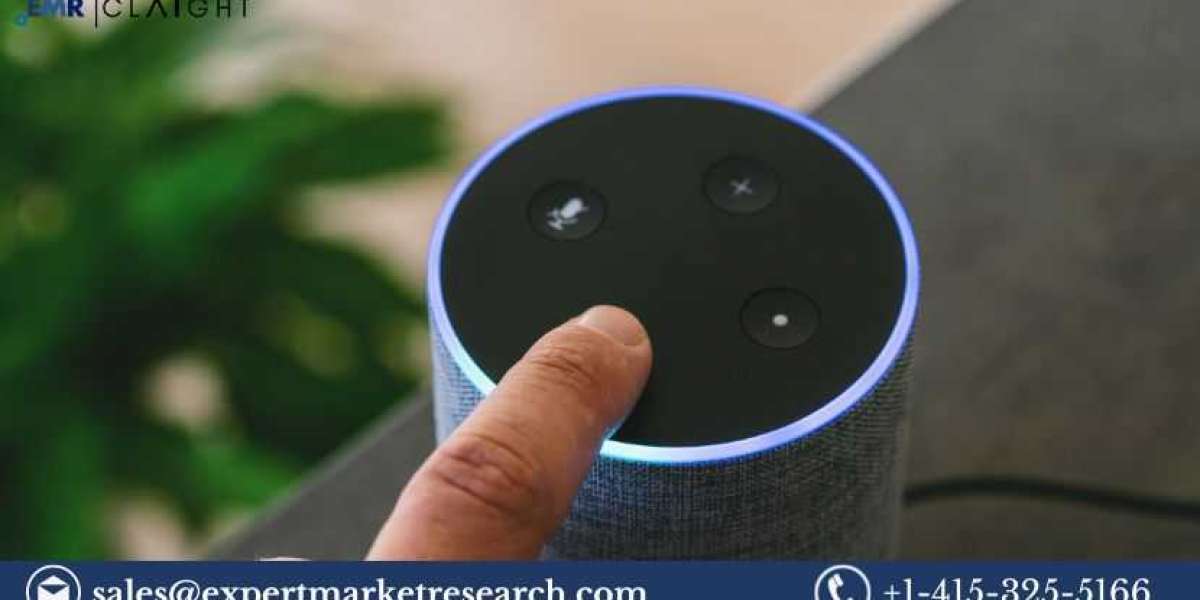The smart speaker market has shown remarkable growth in recent years, reaching a value of approximately USD 10.55 billion in 2023. This surge in market value highlights the increasing adoption and integration of smart speakers in households and businesses worldwide. According to industry forecasts, the market is expected to continue its upward trajectory, growing at a compound annual growth rate (CAGR) of 19.5% from 2024 to 2032, ultimately reaching nearly USD 52.59 billion by 2032. This blog post provides an in-depth analysis of the smart speaker market, covering its overview, market size, trends, segmentation, market share, growth, competitive analysis, and future forecast. We will also address frequently asked questions to offer a comprehensive understanding of this dynamic market.
Smart Speaker Market Overview
Smart speakers, equipped with voice-activated virtual assistants, have revolutionized the way we interact with technology in our homes and workplaces. These devices offer a range of functionalities, from playing music and providing weather updates to controlling smart home devices and answering queries. The convenience and efficiency offered by smart speakers have driven their rapid adoption, making them a staple in modern households.
Smart Speaker Market Size
In 2023, the smart speaker market was valued at approximately USD 10.55 billion. This significant market size underscores the widespread adoption and integration of smart speakers in daily life. The market is poised for substantial growth, with projections indicating a CAGR of 19.5% from 2024 to 2032. By 2032, the market is expected to reach nearly USD 52.59 billion.
Smart Speaker Market Trends
Several key trends are shaping the smart speaker market:
AI and Machine Learning: The integration of advanced AI and machine learning algorithms is enhancing the capabilities of smart speakers, allowing for more accurate voice recognition and improved user experiences.
Multi-Lingual Support: As smart speakers expand globally, the incorporation of multi-lingual support is becoming crucial, allowing users to interact with their devices in various languages.
Enhanced Audio Quality: Manufacturers are focusing on improving audio quality to provide a richer and more immersive listening experience.
Smart Home Compatibility: The increasing compatibility of smart speakers with a wide range of smart home devices is driving their adoption as central control hubs.
Privacy and Security: With growing concerns about data privacy, manufacturers are implementing stronger security measures to protect user data and build trust among consumers.
Smart Speaker Market Segmentation
Intelligent Virtual Assistant
Alexa
Google Assistant
Siri
Dueros
Aligenie
Xiao AI
Others
Component
Hardware
Software
Application
Smart Home
Consumer
Smart Office
Others
Region
North America
Europe
Asia-Pacific
Latin America
Middle East Africa
Get a Free Sample Report with Table of Contents
Smart Speaker Market Share
Several key players dominate the smart speaker market, each with a significant market share. These include:
Amazon: With its Echo line of smart speakers powered by Alexa, Amazon has been a market leader, known for its extensive range of devices and robust ecosystem.
Google: The Google Nest series, featuring Google Assistant, has also captured a significant market share, offering seamless integration with Google's suite of services.
Apple: Known for its premium products, Apple's HomePod series appeals to consumers looking for high-quality audio and seamless integration with other Apple devices.
Other Notable Players: Companies like Sonos, Bose, and Samsung have also established a presence in the smart speaker market, each bringing unique features and strengths to the table.
Smart Speaker Market Growth
The smart speaker market is poised for substantial growth in the coming years. Several factors are contributing to this growth:
Rising Consumer Demand: The increasing preference for hands-free, voice-activated interactions is driving consumer demand for smart speakers.
Smart Home Ecosystems: The growing popularity of smart home ecosystems is boosting the adoption of smart speakers as central control hubs.
Technological Advancements: Continuous improvements in AI, machine learning, and voice recognition technologies are enhancing the capabilities and appeal of smart speakers.
Affordability: The availability of smart speakers at various price points is making them accessible to a broader audience, further driving market growth.
Smart Speaker Market Forecast
The future of the smart speaker market looks promising, with robust growth projected over the forecast period. By 2032, the market is expected to reach nearly USD 52.59 billion, driven by rising consumer demand, technological advancements, and the expanding smart home ecosystem. The CAGR of 19.5% from 2024 to 2032 underscores the market's potential and the opportunities it presents for key players and new entrants alike.
Competitor Analysis
Amazon.com, Inc.: Amazon is a dominant force in the smart speaker market with its Echo line of devices, powered by the Alexa voice assistant. The company's extensive product range, robust ecosystem, and strong brand recognition have helped it secure a significant market share. However, Amazon also faces challenges such as privacy concerns and high competition.
Alphabet Inc.: Alphabet, through its subsidiary Google, is a significant player in the smart speaker market with the Google Nest line of smart speakers, featuring Google Assistant. Google’s seamless integration with its own services, such as Google Search, Maps, and YouTube, gives it a competitive advantage. The company’s focus on AI and machine learning also enhances the capabilities of its smart speakers.
Alibaba Group Holding Limited: Alibaba has made significant strides in the smart speaker market with its Tmall Genie devices. These speakers are particularly popular in China, leveraging Alibaba’s e-commerce and cloud computing strengths. The integration with Alibaba’s vast ecosystem of services, including shopping and entertainment, helps drive adoption among consumers.
Apple Inc.: Apple’s HomePod series appeals to consumers looking for premium audio quality and seamless integration with other Apple devices. Despite being positioned at a higher price point, the HomePod’s superior sound quality and integration with the Apple ecosystem have garnered a loyal customer base. Apple’s strong brand loyalty and focus on privacy and security also enhance its market position.
Others: Other notable players in the smart speaker market include Sonos, Bose, and Samsung. These companies bring their own strengths, such as high-quality audio, strong brand recognition, and diverse product offerings. Each of these players contributes to the competitive landscape of the smart speaker market, driving innovation and enhancing consumer choice.
Read Full Report with Table of Contents
Frequently Asked Questions (FAQs)
Q: What is driving the growth of the smart speaker market?
A: The growth of the smart speaker market is driven by several factors, including rising consumer demand for hands-free, voice-activated interactions, the growing popularity of smart home ecosystems, continuous technological advancements, and the availability of smart speakers at various price points.
Q: What challenges does the smart speaker market face?
A: The smart speaker market faces challenges such as data privacy concerns, high competition, and regulatory issues. Additionally, rapid technological changes and the need for continuous innovation present ongoing challenges for market players.
Q: How do smart speakers integrate with smart home ecosystems?
A: Smart speakers act as central control hubs for smart home ecosystems, allowing users to control various smart devices (like lights, thermostats, and security systems) through voice commands. This integration enhances the convenience and efficiency of managing a smart home.
Q: What is the role of AI in smart speakers?
A: AI plays a crucial role in smart speakers by enabling voice recognition, natural language processing, and machine learning. These technologies allow smart speakers to understand and respond to user commands accurately, providing a more intuitive and interactive user experience.
Media Contact:
Company Name: Claight Corporation
Contact Person: Emily Jacks, Corporate Sales Specialist – U.S.A.
Email: [email protected]
Toll Free Number: +1-415-325-5166 | +44-702-402-5790
Address: 30 North Gould Street, Sheridan, WY 82801, USA
Website:www.expertmarketresearch.com



